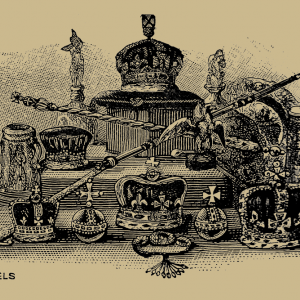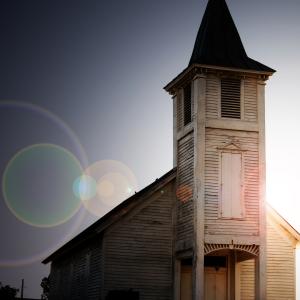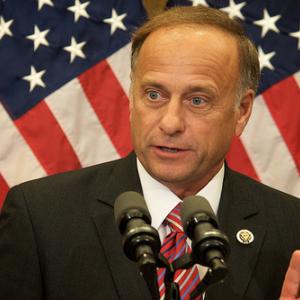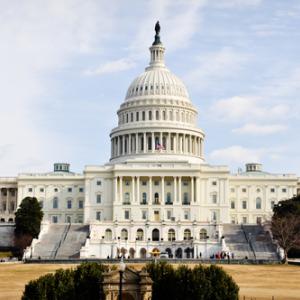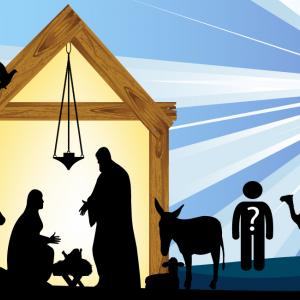
Beau Underwood formerly served as senior director of advocacy for Sojourners. A graduate of Eureka College and the University of Chicago, Beau is an ordained minister in the Christian Church (Disciples of Christ) currently serving a church in Jefferson City, Mo.
Posts By This Author
A Hindu Prime Minister Walks Into a Constitutional Christian Monarchy
And other problems when church and state aren't separate.
RISHI SUNAK'S ASCENSION in October as British prime minister sparked celebration among some as he became the United Kingdom’s first nonwhite and non-Christian leader. Yet, this evolution comes with some awkwardness. The Church of England is an “established” church in which both monarchy and government play official roles. Sunak’s religious identity remains irrelevant for leading Parliament, but his status as a practicing Hindu would seem to impinge on his ability to discern which Anglican priests are best suited for leadership roles within the church hierarchy.
Raising this concern is not an argument that all prime ministers must be Christian — the U.K. rightly has no religious test for the role, as Sunak’s elevation demonstrates. But his ascension reveals a problem with not fully separating church and state. The Church of England now finds itself with a non-Christian in the ecclesial hierarchy. The roles of the monarch and prime minister in church affairs are in modern times more ceremonial than substantive, but Sunak reveals the problem with the entanglement both in principle and in practice.
A Complex Vocation
Varieties of Gifts: Multiplicity and the Well-Lived Pastoral Life, by Cynthia G. Lindner. Rowman & Littlefield.
THE ROLE AND identity of the minister has always been complex: Preacher and teacher, pastor and prophet, counselor and social worker. Despite this inherent dynamism, church structures—seminaries, congregations, denominations—often focus on transforming diverse candidates for ministry into a uniform class of spiritual professionals equipped to serve Christ in a bygone era. Responding to the challenges facing congregations today involves hearing and sharing the gospel in fresh ways, which requires a revolution in how ministers understand themselves and the training they receive.
Cynthia G. Lindner’s Varieties of Gifts does not read like a revolutionary text, but it is iconoclastic. While Lindner does not argue directly with the many books on pastoral leadership encouraging conformity to a specific mold, she gently brushes them away with a thoroughly postmodern conception of the “well-lived pastoral life.” Drawing on insights from dialogical psychology, which highlights the “multiplicity” of the human self, Lindner brings attention to the diverse talents and perspectives of aspiring and seasoned pastors. Too often this plurality is perceived as vocational ambivalence or personal confusion—an obstacle to be overcome in the modern quest to create a unified, coherent sense of self. Yet this pursuit of a single identity deprives ministers of important resources, limiting both their professional effectiveness and satisfaction.
Varieties of Gifts seeks to end this repression and embrace the minister’s natural multiplicity. Lindner believes this path leads to the realization of untapped potential at a moment when religious institutions are desperate to discover new and different ways of being faithful. She writes, “effective ministers have always inhabited plural roles and multiple selves which have funded the flexibility and inventiveness that religious leadership demands over the long haul.” Thus, the internal tensions of the minister’s life (How do I serve this community as both prophet and priest? How do I remain authentic while embodying a role defined by perception?) become a resource in the pursuit of excellence rather than a distraction that promises to lead one astray.
Living on Almost Nothing in America
Welfare reform, 20 years later, has increased poverty - and moral poverty as well.

photosbypanda / Shutterstock
TWENTY YEARS AGO, President Bill Clinton promised to “end welfare as we know it” by signing into law the Personal Responsibility and Work Opportunity Reconciliation Act, otherwise known as “welfare reform.”
Controversial at the time, the law placed a five-year time limit on government financial assistance to those in need and instituted work requirements for welfare recipients. With two decades of hindsight, there is now sufficient evidence to evaluate its effectiveness, the holes it created in our nation’s social safety net, and what needs to be done to address them.
One of the best examinations of this law’s effects is the insightful book $2.00 a Day: Living on Almost Nothing in America. Scholars Kathryn J. Edin and H. Luke Shaefer note that welfare reform has succeeded in important ways. “Poor single mothers,” they write, “left welfare and went to work in numbers that virtually no one expected. In 1993, 58 percent of low-income single mothers were employed. By 2000, nearly 75 percent were working, an unprecedented increase.” While the Great Recession reversed some of this progress, the employment rates remain “above pre-reform levels.” Child poverty rates also fell after welfare reform’s passage and remain down, though the authors note that additional measures, such as the expansion of the Earned Income Tax Credit and increased government spending on child-care programs, also factor into this decline.
But the outcomes are not universally positive. In the first 15 years after passing welfare reform, the number of people living in “$2-a-day poverty” had more than doubled.
In Sickness and Health
Paid sick leave helps not only the workers but businesses as well.
WHAT IS OUR responsibility to expectant mothers, workers suffering from prolonged illness, or parents with children dealing with a significant sickness? Many Christians will assume the “our” in question refers to individual believers or the church as a community of believers. But what if the “our” refers to society as a whole? How is the question answered then?
This is more than an abstract question. Across the U.S.—at local, state, and federal levels—governments are debating policies that would expand paid sick leave. The issue itself isn’t complicated: Some workers have paid time off when they or a family member falls ill, while tens of millions of others—disproportionately low-wage workers—do not. The latter often face the difficult choice of struggling through shifts while sick or staying home and putting their livelihoods at risk.
The benefits of paid sick leave policies are well documented, with studies detailing the economic benefits paid sick leave provides by lowering employee turnover and training costs, reducing public-assistance spending, and improving productivity. “Working sick costs the national economy $160 billion annually in lost productivity,” according to the Journal of Occupational and Environmental Medicine. Even greater gains can be realized when expanded family leave policies are included.
Collateral Damage
Does Christianity have a future in Iraq?
THE U.S. AND other nations are increasingly aware that the so-called Islamic State is a serious, long-term threat to Middle East stability. And it has become clear that there are few good options for addressing the situation without the willingness and ability of the Iraqi government to promote inclusion and weed out corruption.
In the midst of all this, the plight of Iraqi Christians has taken center stage. Since the U.S.-led invasion of Iraq in 2003, more than two-thirds of the Iraqi Christian community has left the country, with many fleeing as a result of violence and religious persecution.
This exodus has only increased as the reach of the Islamic State, or ISIS, has expanded and its reputation for brutality become widely known. The militant group has publicly beheaded hostages for propaganda purposes, committed mass killings, and given Christians the ultimatum: Convert to Islam, pay a fine, or face death if they remain faithful to their beliefs.
Followers of Christ have existed in the area now called Iraq since the earliest days of Christianity. Now there is a serious debate as to whether the faith has a viable future in this ancient of lands.
The Self-Destruction of Mark Driscoll
Churches—like everybody else—need accountability.
OUTSIDE OF BUSINESS circles, accountability is rarely a popular conversation topic. Its implications of deference to authority and limitations on personal freedom are at odds with Western cultural trends. But the controversies that have dogged evangelical pastor Mark Driscoll demonstrate the need for Christians and churches to think more seriously about how authority is understood, exercised, and appropriately checked.
Driscoll, a best-selling author and pastor of Mars Hill Church in Washington state, is known for preaching a “muscular” brand of Christianity and a personal arrogance that fits the part. His views and provocative statements on gender roles, homosexuality, and a variety of other topics have repeatedly sparked debate within evangelicalism, but recent revelations that he pseudonymously posted offensive comments on an online church message board have justifiably brought condemnation from many.
Yet Driscoll’s theology is not the only thing landing him in hot water. A group of more than 20 former Mars Hill pastors have filed a formal grievance with the church based on Driscoll’s leadership style and actions that have been labeled intimidating, controlling, and abusive. Revelations that church funds were spent to buy copies of his book in the hopes of making it a New York Times bestseller and allegations of plagiarism resulted in a formal apology and his publisher pulling books from store shelves. This fall, Driscoll took a multiple-week leave of absence and sought counseling while the church reviewed the complaints against him.
Singing Our Theology
The deep, dark secret of the church is that the beliefs and convictions of Christians are often shaped far more by the hymns we sing than the theological tomes gathering dust on our bookshelves. Songs are avenues for praising God, but they are also tools for imparting knowledge. Singing is a theological exercise, so the words printed in hymnbooks or flashed on screens deserve attention and reflection.
“How Great Thou Art” has been sung in churches, automobiles, and probably the occasional shower since the late 19th century. Long used in traditional worship services, many contemporary artists are offering their own renditions of this classic and adapting it for more contemporary settings. Even Carrie Underwood (no relation) is getting into the act.
This is an ode to God’s majesty and power. It testifies to the beauty created by God’s hand and witnesses to the connection between the love behind God’s creative acts and the love poured out by Christ on the cross.
The famous opening line, “O Lord my God, When I in awesome wonder, Consider all the worlds Thy Hands have made” sets the stage. They also easily get stuck in your head playing on endless loop.
Creation – stars, thunder, forest, birds, majestic mountains, gentle breezes, and everything else – indicates the greatness of God. It provokes wonder among us humans, forcing us to acknowledge the subordinate relationship between creature and Creator. We cannot do what God has done; our accomplishments will always pale in comparison.
The Dangers of Bi-Vocational Ministry
I eat, sleep, and breathe faith and politics; it is my passion and calling. From 9-5 each weekday, I direct communications and advocacy for Sojourners, moving around Washington, D.C. for various meetings, engaging with reporters and the media, and planning advocacy strategies around pressing justice issues. Then I turn off my computer and walk out the door. But instead of going home, I’m usually off to another meeting that has little to do with politics and everything to do with faith.
I’m a bi-vocational pastor, and I spend 15-20 additional hours working in a local congregation alongside several clergy colleagues, who themselves are a mix of full-time and part-time ministers. Serving in a church keeps me rooted. It provides perspective when the dysfunctions of Washington threaten to consume me. Helping people discover faith and integrate it into their lives renews and enlivens my soul.
Part of me pretends that I’d be spending this much time worshiping on Sunday morning and hanging out with my fellow young adults anyway, so I might as well be polishing my ministerial skills. But when I’m honest, I know it isn’t close to the same thing. I am way more invested in people’s lives – their joys and concerns – and the life of a particular community than I otherwise would be as “just a member of the congregation.” It is a demanding role that can be emotional, mentally and spiritually draining at times, but I love every minute of it. This is what I was made to do. Being a pastor is my identity. This calling is fundamental to who I am and how I understand myself in the world.
The number of bi-vocational ministers is increasing rapidly. Many pastors who work full-time jobs and serve in congregations part-time receive little or no pay for their church service. This trend has been described as “the future of the church” and extolled because the model is a return to “the original church” that will “enliven congregations.”
To the Dying Church: Use Your Words
To the dying church,
The ongoing decline of American Christianity is well documented. A quick Google search of “mainline decline” provides statistics, commentary, and variously tried and discarded solutions related to the struggles of liberal protestantism in the United States. More recently, these trends are showing up in conservative Christian circles as well. The attention of the media, religious scholars, and cultural warriors has been captured by the rise of the “nones,” the “spiritual but not religious,” humanists, and evangelistic atheists.
It is clear who’s ascending and who’s falling. Organized religion is doomed. You, dying church, are in trouble.
I have seen your sickness up close. The congregation where I was baptized — once full on Sunday mornings — now barely hangs on. The church where I preached in college has long since closed its doors. My pastor friends spend their days worrying about shrinking worship attendance and a lack of financial resources for carrying out their ministry. Denominations pause from fighting and splitting just long enough to make budget cuts and lay off staff.
What can be done? What should be done? Is this a new reality that we simply must accept?
Debt Ceiling 101: Boundaries and Original Sin
The world as we know it may end on Oct. 17.
This statement seems hyperbolic. It sounds like another absurd prediction of the end times that garners far too much attention from the media. But this isn’t about the fulfillment of biblical prophecy. Unless the Congress raises the debt ceiling, Oct.17 is the date that the United States government runs out of money to pay its bills.
The consequences could be catastrophic.
Defaulting on our financial obligations would shatter the global confidence in the U.S. dollar that has made it the worldwide reserve currency. U.S. Treasury bonds would no longer be perceived as safe investments, which means creditors would demand higher interest rates to purchase the bonds because of the increased investment risk. The rise in interest rates would make U.S. debt more expensive to finance, leading to more government spending and slower economic growth. The U.S. Treasury believes a default could cause another recession far worse than what we experienced in 2008.
Of course, this pending crisis is completely manufactured and entirely avoidable.
Why the Debt Ceiling Matters
These manufactured crises show how much our politics could use a dose of moral sanity.
AS FIGHTS ABOUT the budget and other economic issues are again riveting the nation’s capital, the rest of the country yawns. Possible government shutdowns, threats to default on our nation’s debt, and proposals to decimate food assistance for struggling Americans seem to be business as usual in Washington, D.C. These budget battles have become so frequent that it is tempting to dismiss it all as political posturing. But that would be a mistake.
The biggest challenge facing Congress should be a non-issue. The debt ceiling is simply the amount of debt the U.S. is legally allowed to hold. It is about paying off the bills that Congress has already incurred from past appropriations—not about giving permission for new government spending, as many people falsely assume. Congress has raised it nearly 100 times since the end of World War II, but it only recently became a political football. Because the consequences of not raising the debt ceiling and defaulting on our nation’s obligations could be catastrophic, some leaders have tried to leverage it for political gain. After the country came close enough to a default in 2011 to receive a credit downgrade, President Obama has responsibly refused to negotiate over raising it. His assumption is that GOP leaders in Congress wouldn’t throw the economy off the cliff for their own political gain. The American people are left watching this game of chicken and hoping somebody blinks.
While this is clearly a partisan game, the stakes couldn’t be higher. The U.S. has always honored its debts. Should the country default, the market turmoil and long-term effects could be catastrophic for the global economy. Domestically, it could throw the U.S. back into recession.
Rep. Steve King: It's Time to Tame the Tongue
In the New Testament book of James, we are cautioned about the power of our tongues. “With the tongue we praise our Lord and Father, and with it we curse human beings, who have been made in God’s likeness. Out of the same mouth comes praise and cursing. My brothers and sisters, this should not be” (3:9-10).
This is a lesson that Iowa Congressman Steve King apparently needs to learn. On Sunday, Rep. King appeared on Meet the Press and stood by his outrageous assertion that:
“For every [undocumented immigrant eligible for the DREAM act] who’s a valedictorian, there’s another 100 out there that weigh 130 pounds and they’ve got calves the size of cantaloupes because they’re hauling 75 pounds of marijuana across the desert.”
Given the absurd and offensive nature of his statements, strong criticism swiftly followed. The Washington Post’s fact checker awarded it “Four Pinocchios,” which is a rating that is only applied to “whoppers.” House Speaker John Boehner previously denounced the comments as “offensive” and out of line with our society’s values.
Rep. King is known as an ardent opponent of immigration reform and has made controversial statements in the past, so his latest remarks are neither shocking nor a surprise.
But they should be.
The 5 Rules of Recess
As a kid, the school day revolved around recess. The bell rang, the books closed, and we bolted out of the building and onto the playground. For a few brief minutes anything was possible. Imaginations ran wild, transporting us to far off lands and transforming us into superheroes and sports stars. We cemented friendships and started fights; we formed alliances and enemies. And while our teachers and parents assumed that math, science, reading, and social studies structured our day, in reality our lives were defined by what transpired during recess.
Congress is in recess during the month of August. While many assume they have taken an extended vacation, nothing could be further from the truth. Recess is just as important now as it was when we were kids, but the rules have changed. Here are five things you need to know about the next month.
In God We Trust
If asked, “what is the most challenging Sunday to preach a sermon?” I suspect few pastors would say July 4th weekend. But as leaders providing spiritual guidance in a country that is often associated with strong nationalistic tendencies, offering a word that speaks to the messy relationship between “God and Country” is a task that American pastors cannot take lightly.
This dilemma of competing loyalties is not new. In both Matthew and Mark, Jesus is approached by opponents who sought to trap him by asking whether they were obligated to pay Roman taxes (Matthew 22:15-22; Mark 12:13-17). An affirmative response would have been a betrayal of faith but a negative answer would be perceived as an act of sedition. Faced with this paradox, Jesus wowed his inquisitors by telling them to give Caesar what was due to Caesar and God what was due to God. Yet, as Franklin Gamwell, notes in Politics as a Christian Vocation, this only raises the question of what belongs to each of the competing authorities. If Christians are called to love God with all our being, then how can anything not belong to God? How can any other authority make a claim of allegiance on our lives?
Sierra Club Endorses Immigration Reform
If Congress passes immigration reform, much of the credit will be given to the broad and diverse voices that have lined up in support of fixing our nation’s broken immigration system. Both the labor and business community have been instrumental in moving legislation forward, while the evangelical community’s call to “welcome the stranger” has received significant attention by politicians and the media. The coalition of supporters continues to grow, as last week the Sierra Club, the oldest environmental organization in the country, announced its support for immigration reform.
Why would an environmental organization get involved with immigration reform? What could they possibly have at stake?
A lot.
Where Idolatry Rages, Prophets Speak Out
Guns are dangerous idols. While mass shootings are happening at an alarming rate and an epidemic of gun violence plagues our nation’s cities, our society’s fanatical devotion to weapons prevents us from enacting solutions to curb the violence. The cost of worshipping these false idols continues to rise, as firearms kill more than 80 people a day.
Since the Dec. 14 shooting in Newton, Conn., nearly 3,500 people have died because of a gun. Some of them were suicides. Some were gang-related gun deaths. Many use these facts to insinuate that the deaths somehow aren't equally tragic. But as Christians we know that all of them were children of God created in the Divine image.
While the idolatry rages on, prophets are beginning to speak out.
The Budget Battles are Back
While immigration and gun violence issues are capturing most of the week's headlines, the budget battles have re-emerged in Washington, D.C. Last month House Budget Chairman Paul Ryan (R-Wis.) and Senate Budget Chairwoman Patty Murray (D-Wash.) released competing budget proposals. And today, President Barack Obama released his own plan, which aims to reduce the deficit through a combination of spending cuts and revenue increases.
As The Washington Post's Ezra Klein and Evan Soltas note:
Today’s budget is the White House’s effort to reach the bedrock of the fiscal debate. Half of its purpose is showing what they’re willing to do. They want a budget compromise, and this budget proves it. There are now liberals protesting on the White House lawn. But the other half is revealing what the GOP is — or, more to the point, isn’t — willing to do. Republicans don’t want a budget compromise, and this budget is likely to prove that, too.
As the White House sees it, there are two possible outcomes to this budget. One is that it actually leads to a grand bargain, either now or in a couple of months. Another is that it proves to the press and the public that Republican intransigence is what’s standing in the way of a grand bargain.
The Missing Figurine in Your Nativity Scene
In the church where I grew up, the first Sunday in Advent was dubbed the “hanging of the greens.” On that special Sunday, we sang carols in the decorated sanctuary, all culminating in the children’s live nativity scene. The service never changed from year to year. The only variables were how many kids needed roles and which young child would get stage fright, thus leaving part of the the story without visual representation.
It always seemed like the doves were cursed. The doves rarely remained on stage for the entire performance. Over the years, I was a variety of animals — a wise man, a shepherd, and finally Joseph. I never got stage fright. I was never a dove. I can only imagine what my mother would’ve done if I had been that kid.
It took me years to realize that there was a character missing from my congregation’s telling of the story. We always left out King Herod.
This was a huge oversight, because Herod plays a major role in Matthew’s account of Jesus’ birth.
The Power of Christmas
“Faith is recognizing that if at Christmas Jesus became like us, it was so we might become more like him,” wrote the well-known preacher and activist William Sloan Coffin. He goes on to add, “We know what this means; watching Jesus heal the sick, empower the poor, and scorn the powerful, we see transparently the power of God at work.”*
Christmas really is about seeing the power of God at work, but far too often pastors and churches fail to tell this story. Oh sure, we preach about Mary and Joseph, Jesus being born in a Bethlehem manger, and the Magi following a star to find him and offer gold, frankincense, and myrrh. My fear is that the story has grown familiar and routine. We have forgotten its power and no longer see its challenge.
In Matthew’s Gospel, the Magi seek out Jesus after hearing of his birth. In order to find him they ask King Herod where they can find the new king. This, of course, is news to Herod who is surprised to learn that his title has been claimed by a baby. Herod consults his advisors and then reacts with the expected calmness of a leader anticipating a conflict, which is to say his response is not calm at all.
This story is an announcement that Jesus has arrived to challenge the powerful. The Messiah was not born meek and mild.
Falling off the Fiscal Cliff: 5 Things You Need to Know
Now that the election is over, policymakers and the media have refocused their attention on the looming budget battles in Washington. In January, a variety of tax increases and spending cuts will go into effect unless Congress and President Barack Obama agree on a plan to avoid what has been deemed “the fiscal cliff.”
As the country braces for another fiscal showdown in the nation’s capitol, here are five things you need to know on the issue likely to dominate the news over the next several months.
